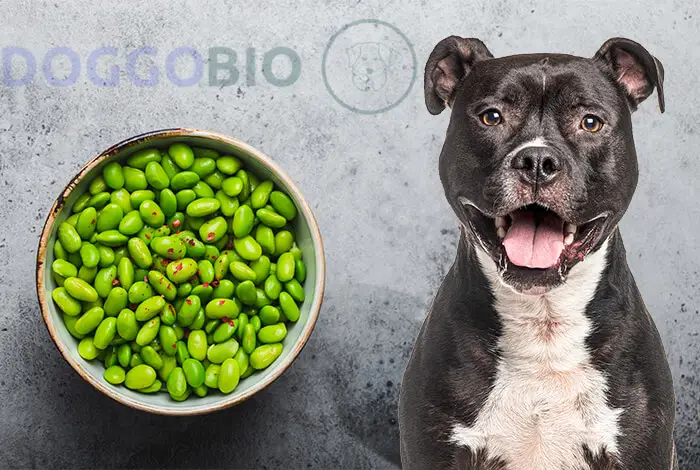“Can dogs eat edamame?” is a common question among pet owners. Our canine companions are known for their curious taste buds and willingness to sample various foods. As responsible pet owners, it’s only natural to wonder about the safety and nutritional benefits of different foods we might be tempted to share with them.
Edamame, those delightful young soybean pods often found on sushi menus and in healthy snack bowls, is one such food that might pique your curiosity. Can dogs eat edamame? As you’ll discover in this article, the answer is a cautious “yes.” However, before you treat your furry friend to a few edamame beans, it’s essential to understand the nuances of this nutritious snack and how it can fit into your dog’s diet.
In this comprehensive guide, we’ll explore the potential benefits and risks of feeding edamame to dogs and some essential guidelines to ensure your pet’s well-being.
Can Dogs Eat Edamame?

Yes, dogs can eat edamame, but with precautions.
Edamame is safe and nutritious for dogs, offering omega-3, calcium, and protein benefits. However, it should be served plain and without the pods to avoid choking hazards and digestive issues.
Dogs with soy allergies should avoid edamame; overfeeding or adding seasonings can cause health problems.
The Nutritional Value of Edamame for Dogs
- Edamame is a good source of protein, fiber, vitamins, and minerals such as vitamin K, folate, and manganese.
- It also contains antioxidants and is low in calories, making it a healthy snack for humans.
However, when it comes to dogs, their nutritional needs differ from ours, and what may be beneficial for us may not necessarily be suitable for them.
Potential Health Benefits of Edamame for Dogs
Despite the challenges in digesting edamame, this snack can offer dogs some potential health benefits.
- As mentioned earlier, edamame is a good source of protein, which is essential for building and maintaining muscle mass in dogs.
- It also contains fiber, aiding digestion and promoting bowel regularity. The antioxidants found in edamame may also have anti-inflammatory properties and help boost the immune system.
However, it’s important to note that these benefits are based on studies done on humans, and more research is needed to determine if they apply to dogs as well.
Risks of Feeding Edamame to Dogs

While there are potential benefits to feeding edamame to dogs, it’s important to be aware of the risks involved.
- Firstly, dogs lack the enzyme necessary to break down soy, which can result in digestive issues.
- Moreover, edamame contains phytic acid, which may hinder the absorption of essential minerals like calcium, iron, and zinc, potentially leading to nutrient deficiencies.
- Additionally, seasoned edamame often contains salt, posing a risk of sodium ion poisoning if consumed excessively.
- Allergic reactions are another concern, albeit rare. Symptoms may include itching, swelling, and difficulty breathing.
- Furthermore, the pods themselves can present a choking hazard, particularly if the dog is unfamiliar with them. Removing the pods before feeding edamame is crucial to prevent potential choking incidents.
How to Safely Feed Edamame to Your Dogs?
If you’ve decided to feed your dog edamame, there are some precautions you can take to ensure their safety.
- Firstly, make sure to remove the pods before feeding it to your dog. This will eliminate the risk of choking and make it easier for them to digest.
- Secondly, start with small amounts and monitor your dog’s reaction. If they show signs of digestive issues or allergies, stop feeding them edamame immediately.
- Lastly, opt for unsalted edamame to avoid any potential sodium poisoning.
Alternatives to Edamame for Dogs

If you’re looking for a healthy snack to share with your dog, there are plenty of alternatives to edamame that are safer and more suitable for their nutritional needs.
Some options include:
- Cooked lean meats such as chicken or turkey,
- Steamed vegetables like carrots or green beans,
- And fruits like apples or bananas.
Just make sure to always consult with your veterinarian before introducing any new foods to your dog’s diet.
Some Posts You Wanna Read More
- Can Dogs Eat Capers?
- Can Dogs Eat Ginger?
- Can Dogs Eat Figs?
- Can Dogs Eat Chestnuts?
- Can Dogs Eat Apricots?
- Can Dogs Eat Butternut Squash?
- Can Dogs Eat Eggplant?
Frequently Ask Question
Can puppies eat edamame?
No, puppies should not eat edamame. Their digestive system is still developing, and they may have a harder time digesting it than adult dogs. It’s best to wait until they are fully grown before introducing edamame into their diet.
Can dogs eat frozen edamame?
Yes, dogs can eat frozen edamame if it is unsalted and the pods have been removed. However, it’s important to thaw it before feeding it to your dog to avoid any potential digestive issues.
Can dogs eat edamame beans?
No, dogs should not eat edamame beans. The beans are the main component of edamame and contain high levels of phytic acid, which can interfere with nutrient absorption in dogs.
Can dogs eat edamame pods?
No, dogs should not eat edamame pods as they pose a choking hazard and are challenging to digest.
Can dogs eat edamame hummus?
No, dogs should not eat edamame hummus. Hummus often contains ingredients that are harmful to dogs, such as garlic and onion, and may also be seasoned with salt.
Conclusion
In summary, the answer to the question, “Can dogs eat edamame?” is yes, but with caution. Edamame can be a nutritious and enjoyable dog treat when served in moderation.
However, always consider your dog’s dietary needs and consult your veterinarian to ensure their well-being. Responsible pet ownership means making informed choices to keep your furry friend happy and healthy.

Pingback: Can Dogs Eat Eggplant? Discover the Benefits and Risks! 2024
Pingback: Can Dogs Eat Capers: Unlocking the Mystery 2024
Pingback: Can Dogs Eat Ginger? Ignite Your Dog's Vitality 2024
Pingback: Can Dogs Eat Chestnuts? Expert Insights and Caring Tips 2024